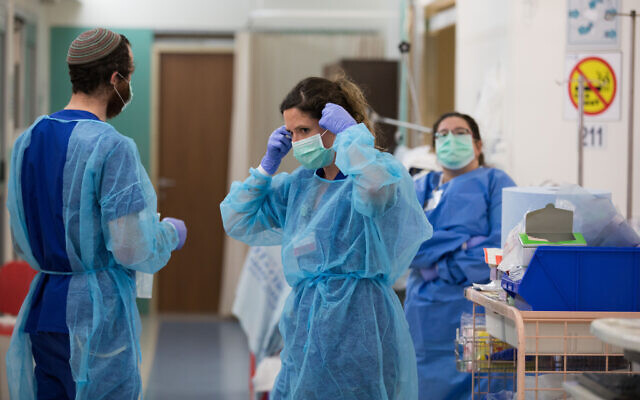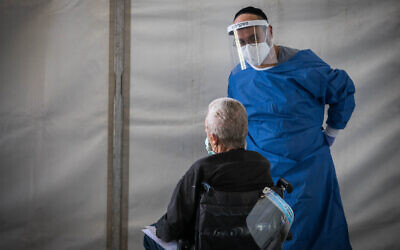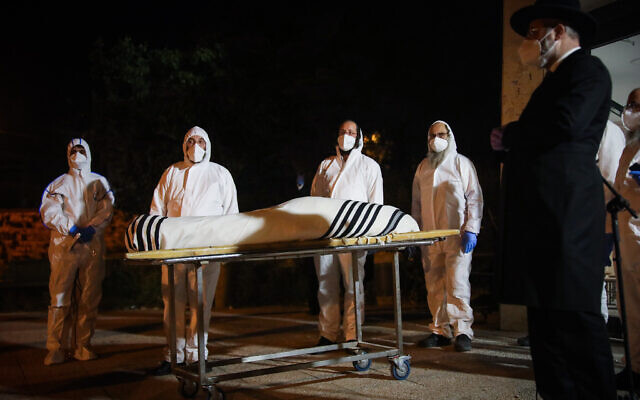Most people we lost to COVID were already near death — Jerusalem hospital chief
Coronavirus ‘tipped over’ patients who would have died of other causes within year, says Shaare Zedek head Ofer Merin
A hospital chief said most COVID-19 patients who died at his institution had around a year’s life expectancy.
“Coronavirus was the thing that tipped them over, but to be honest, for most of these patients who died here in Shaare Zedek, the chance is they had a year of life expectancy, not much more,” said Ofer Merin.
Around 1 in 10 Israelis who have died from coronavirus succumbed at Shaare Zedek Medical Center in Jerusalem, where Merin is director-general. Almost all of the institution’s fatalities were both elderly and had other diseases, he told The Times of Israel.
“Most of the patients who died would maybe be alive now, but coronavirus didn’t affect them in a different way than flu,” he said, drawing a parallel between COVID-19 and common influenza as diseases whose fatalities are mostly elderly people with preexisting conditions.
“We did not lose a single patient who was a healthy young person,” he commented.

Ofer Merin, director-general of the Shaare Zedek Medical Center in Jerusalem (Hadas Parush/Flash90)
The current coronavirus death count in Israel is 278, and the Health Ministry has provided age profiles for the first 237 fatalities. There were two people in their thirties, three in their forties, seven in their fifties, and 23 in their sixties. The rest were aged 70 or older, and the average age of the entire group was 81.3. The data did not include details of preexisting conditions.
At Sheba Medical Center in Ramat Gan, chief medical officer Eyal Zimlichman also reported a high incidence of other illnesses in patients who have died from COVID-19.
“The vast majority had preexisting conditions, more than 95%,” he told The Times of Israel, adding that the average age of death in his hospital’s coronavirus wards has been 75 to 80. Zimlichman said he couldn’t estimate the life expectancy of patients who died.
The doctors’ comments come amid growing debate over whether Israel has handled the coronavirus crisis well, or overreacted.
Prime Minister Benjamin Netanyahu announced, when introducing coronavirus restrictions in March, that he was doing so to “save the lives of tens of thousands.” To some, like Moshe Bar Siman-Tov, who recently stepped down as director-general of the Health Ministry, the fact that the current death toll is much lower than feared reflects a successful strategy, while others including Yaakov Litzman, who was health minister until Sunday, claim otherwise. Litzman said in an interview on Sunday that “panic” in the government was “overblown.”
Israel, with its 278 fatalities, has 32 deaths per million citizens. Sweden’s 3,743 deaths puts it at 371 deaths per million people, and the UK, with its 35,341 deaths, has 521 per million.
‘A horror movie’ scenario for medical staff
As well as discussing morbidity, Merin spoke during his Times of Israel interview about his hospital’s general management of the pandemic.
“If you would want to try to script a horror movie for staff this is exactly the movie that you would script,” he said, with doctors encountering a disease they don’t know how to treat or cure, and which is highly contagious to medical workers

Medical staff working at a now-closed COVID-19 unit at the Shaarei Zedek Medical Center in Jerusalem, March 31, 2020. (Nati Shohat/FLASH90)
Merin is now breathing a sigh of relief after closing down most coronavirus wards due to lack of demand, shutting the special emergency room for infected people last weekend, and just receiving the results of serological testing that shows that only 3% of the 4,500 staff members caught the virus.
“This figure is a success, as it’s a contagious disease,” he said, adding: “Staff members had to work with patients who had COVID-19, and with this risk we expected a much higher level of infection.”

Illustrative: Shaare Zedek Medical team receives a coronavirus patient in Jerusalem on April 16, 2020. (Nati Shohat/Flash90)
The 3 percent statistic was calculated after conducting blood tests on a sample of one in nine staffers. The tests show whether people caught the virus at any point by checking whether they have the antibodies that people generate when infected.
With almost 10% of staff quarantined at some point, more than triple the proportion of staff who caught the virus, Merin said he concludes that isolation rules worked well to stop any significant transmission in the hospital.
He said that his hospital is getting ready for a possible second wave, possibly in the winter. He said that if the curve is not sharp, his hospital will cope, though a further spike could present challenges as as “the capacity of hospitals is full, especially in the wintertime in medical wards.”
Speaking generally about Israel’s hospitals, Merin said: “We don’t have much space, this is the truth. If we’re looking at countries like Japan, capacity is better.”
https://www.timesofisrael.com/the-people-we-lost-to-covid-were-already-near-death-jerusalem-hospital-chief/

No comments:
Post a Comment